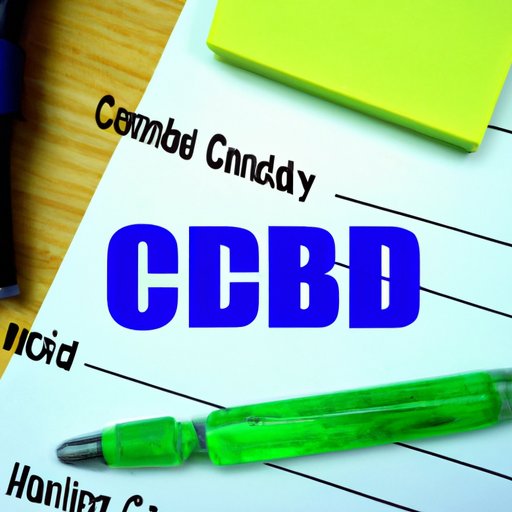Introduction
As the use of CBD continues to rise, many consumers are wondering how it may impact their employment. Drug testing is a common practice in many workplaces, and the legality and potential effects of CBD use on these tests can be confusing. In this article, we will explore the relationship between CBD use and employment drug tests.
Can CBD Use Affect Employment Drug Tests? Here’s What You Need to Know
CBD, or cannabidiol, is a compound found in the cannabis plant. It is non-psychoactive and has been shown to have potential health benefits. However, some CBD products may contain trace amounts of THC, the psychoactive compound in cannabis that drug tests typically screen for.
Drug tests work by analyzing a sample of a person’s urine, blood, or hair for the presence of certain substances. The most common type of drug test is a urine test, which typically screens for THC metabolites.
While CBD use, in general, is unlikely to cause a positive drug test result, it is possible that some CBD products may contain enough THC to trigger a positive result.
The Relationship Between CBD and Drug Testing in the Workplace
The current state of drug testing policies in the workplace varies by industry and employer. Some industries, such as transportation or healthcare, have strict drug testing policies in place to ensure safety. Other employers may only conduct drug tests in certain circumstances, such as after an accident or suspicion of drug use.
When it comes to CBD, there is no one-size-fits-all policy for employers. Some employers may prohibit any CBD use, while others may only prohibit CBD products that contain THC.
Regardless of an employer’s policy, it is important for individuals to be aware of the potential consequences of CBD use for employment. A positive drug test result can lead to termination or other disciplinary action, even if the individual was using CBD legally and for medical purposes.

Exploring the Legal and Practical Effects of CBD Use on Employment Drug Tests
The legal considerations surrounding CBD use in the workplace are complex. While CBD is legal at the federal level, some states have stricter regulations around its use. Additionally, some employers may have their own policies regarding CBD use.
In terms of practical effects, it can be difficult to determine how much THC is in a CBD product without proper testing. Additionally, factors such as the dose and frequency of CBD use can impact drug test results.
Employers may approach testing for CBD differently depending on their policies and the industry they operate in. Some employers may choose not to test for CBD at all, while others may conduct more frequent or thorough testing.

Why Many Employers are Dropping Marijuana Testing But Still Check for CBD Use
As more states legalize marijuana for recreational and/or medicinal use, some employers are re-evaluating their drug testing policies. Some companies have stopped testing for marijuana use altogether, citing a lack of evidence linking marijuana use with decreased job performance or workplace safety.
However, CBD use may still be monitored in some workplaces, as it is a relatively new and untested area. Employers may also be concerned about potential legal or liability issues related to CBD use by employees.
Changing drug testing policies can have significant impacts on both employers and employees. For example, employees may feel more comfortable using CBD products, knowing that they will not be penalized for a positive drug test result.
Will Taking CBD Oil Cause You to Fail a Drug Test at Work? It Depends on These Factors
As mentioned earlier, there are several factors that can impact drug test results. When it comes to CBD use, the following factors may be particularly important to consider:
- The amount of THC in the CBD product
- The dose and frequency of CBD use
- The method of CBD consumption (e.g. smoking, vaping, edibles, etc.)
To minimize the risk of a positive drug test result, individuals should opt for CBD products that are labeled as THC-free or contain only trace amounts of THC. They should also be cautious about the dose and frequency of CBD use, and avoid consuming CBD through smoking or vaping.

Navigating the Grey Area of CBD Use and Drug Testing in the Workplace
Given the lack of clear regulations surrounding CBD and employment drug testing, it can be difficult for individuals to determine the best course of action. Some strategies that may be helpful include:
- Researching an employer’s drug testing policy before using any CBD products
- Choosing CBD products that are labeled as THC-free or contain only trace amounts of THC
- Being open and honest with employers about CBD use, especially if it is for medical purposes
Ultimately, the decision to use CBD while employed should be made carefully and with consideration for the potential risks and benefits.
Conclusion
Employment drug testing policies are complex and varied, and the relationship between CBD use and these policies is still relatively untested. While some employers may prohibit any CBD use, others may approach testing for CBD differently, depending on their policies and industry. Individuals should be aware of the potential consequences of CBD use for employment and take steps to minimize the risk of a positive drug test result.
The future of CBD and drug testing in the workplace is still uncertain, but as regulations and policies continue to evolve, it is important for individuals to stay informed and make decisions that best serve their needs and interests.
